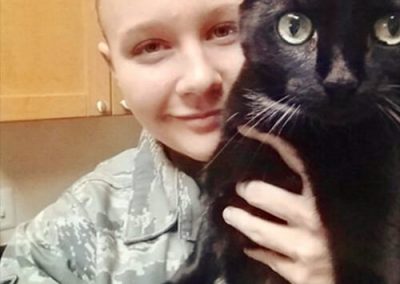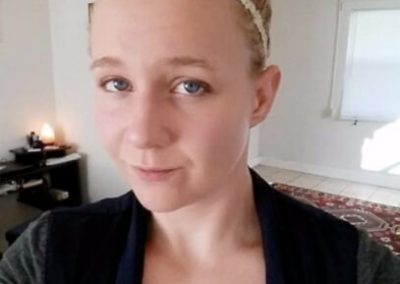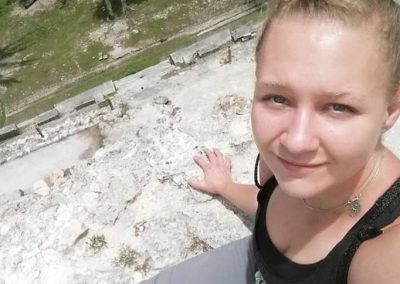Frequently Asked Questions about Reality Winner
Who is Reality Leigh Winner?
Reality Leigh Winner is a 25-year-old veteran who has dedicated her career to serving the United States. Prior to becoming a federal contractor, she served in the Air Force for 6 years, including as a language analyst — Winner speaks Pashto, Farsi, and Dari.
She was honored with the Air Force Commendation Medal, for members who have “distinguished themselves by meritorious achievement and service.” The award noted that she “provided over 1,900 hours of enemy intelligence exploitation and assisted in geolocating 120 enemy combatants.”
She has no criminal history. Her stepfather described her as “a patriot.” Her mother Billie Winner-Davis said, “She loves children. She loves animals … She’s not a threat to anyone.”
Outside of her work, she is a yoga instructor and dedicated social justice advocate who speaks out in defense of racial justice and human rights on social media.
Can I write to Reality Winner in jail?
Yes, we hope you do. Please write Reality at the at this address:
Reality L Winner
Carswell Federal Medical Center,
PO Box 27317
Fort Worth, Texas 76127
It is important to address the envelope in black ink and don’t enclose stamps. Reality appreciates all mail she receives.
- Do not mail anything of value, including money or stamps.
- Do not use an address label with her name on it when sending mail.
- All correspondence is reviewed by prison staff.
- More information about communicating with Reality, including how to send her money for her prison commissary account.
How Can I Help?
Please go to the menu above under take action and sign up, or click here.
Is Reality Winner her real name?
How many years in prison is she facing?
Reality Winner was left with not choice but to plead guilty to one felony count under the Espionage Act for the unauthorized transmission of national defense information. The Espionage Act does not allow a public service defense, or much of any defense really.
What is Reality Winner charged with?
Winner is charged with violating the Espionage Act of 1917, 18 U.S.C. § 793(e). According to this section of law, someone with access who transmits classified documents can face severe punishments if “the possessor has reason to believe” that the documents “could be used to the injury of the United States or to the advantage of any foreign nation.” (Although the latter is not required to be proven, merely stated.)
The Espionage Act, written over 100 years ago, was meant for spies and saboteurs, yet the US government has transformed a law in recent years in order to put leakers and whistleblowers in jail for giving information to journalists in order to inform the American public of information they have a clear right, and this case a documentable need to know.
It’s impossible for a whistleblower charged under the Espionage Act to receive a fair trial, because they are denied an opportunity to explain why they shared documents and are prevented from ever discussing the harm—or lack thereof—suffered by the country as a result of the leaks. The importance of the documents to public discourse has been considered inadmissible in all cases brought in the modern era.
The vague language of the Espionage Act makes it ripe for abuse, making it a potential weapon against both whistleblowers as well as news outlets that publish leaked documents. Many civil liberties experts have questioned whether or not the Espionage Act would stand up to a First Amendment challenge.
Can Reality Winner write a book, or glean any kind compensation or benefit from her experience now or in the future?
No. According to her Plea Agreement, even future family members or associates will not be able to write or transmit any of her experience for any “compensation” either directly or indirectly.
“This assignment includes, but is not limited to, any compensation provided to the Defendant in connection with any book, writing, electronic communication, article, film, documentary, or other production. This assignment includes all compensation for the benefit of the Defendant, regardless of whether such compensation is payable to her or others, directly or indirectly, for her benefit, or the benefit of her associates or a current, former, or future member of her family. The Defendant shall not circumvent this assignment by assigning the rights to her story to an associate or to a current, former, or future member of her family, or to another person or entity who would provide some financial benefit to her, to her associates, or to a current, former, or future member of her family. Moreover, she shall not circumvent this assignment by communicating with an associate or family member for the purpose of assisting or facilitation their profiting from a public or private dissemination, whether or not such an associate or other family member is personally or directly involved in such dissemination.“
In fact, a go fund me account was set up by a concerned supporter that helped with the vast amount of her mothers additional expenses caused by Reality’s incarceration, and the fact she had to leave her employer of many years to take care of the responsibilities her daughter couldn’t get to while behind bars. The money had to be returned to the Federal Asset Forfeiture program even though the funds were not illegally obtained, intended to support Reality, or to support her mother personally. Reality’s whole family found themselves unexpectedly taking care of two households, driving hundreds of miles taking care of things Reality was not able to due to being removed abruptly from her home, immediately jailed, and denied bail four times. Astoundingly, when Billie Winner Davis asked if she could work with Go Fund Me to return the money to the kind and generous people who donated it, her request was denied.Worried the plea would be rescinded, Billie complied.
Is Reality Winner free now?
No. Prosecutors argued that Winner is a flight risk and denied bail on four separate occasions, even though her family offered their home in Texas as a bond and the court retained her passport. That means Winner was forced to wait in a Georgia jail, without the support of friends and family, for many months before having to plea and being painstakingly transported to the prison where she will serve the rest of her time.
Winner has no prior criminal history and has no ongoing access to classified materials. Most likely, the government was hoping the difficulty of living in jail would push Winner to settle the case, rather than mounting an all but impossible legal defense. They may also be hoping that life behind bars will demoralize Winner, making her feel hopeless and cut off from friends, family, and supporters as she has been for much of her time incarcerated, when not entirely cut off, she has had extremely limited contact with family, friends, and supporters.




